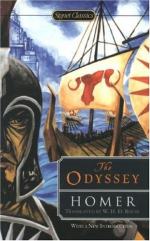Then didst thou make answer, swineherd Eumaeus: ’He speaks aright, and but as another would deem, in that he shuns the outrage of overweening men. Rather would he have thee wait till the going down of the sun. Yea, and it is far meeter for thyself, O queen, to utter thy word to the stranger alone, and to listen to his speech.’
Then the wise Penelope answered: ’Not witless is the stranger; even as he deems, so it well may be. {*} For there are no mortal men, methinks, so wanton as these, and none that devise such infatuate deeds.’
{* Placing at colon at [Greek], and reading [Greek] (cf. xix.312).}
So she spake, and the goodly swineherd departed into the throng of the wooers, when he had showed her all his message. And straightway he spake to Telemachus winged words, holding his head close to him, that the others might not hear:
’Friend, I am going hence to look after thy swine and the things of the farm, thy livelihood and mine; but do thou take charge of all that is here. Yet first look to thyself and take heed that no evil comes nigh thee, for many of the Achaeans have ill will against us, whom may Zeus confound before their mischief falls on us!’
And wise Telemachus answered him, and said: ’Even so shall it be, father; and do thou get thee on thy way, when thou hast supped. And in the morning come again, and bring fair victims for sacrifice. And all these matters will be a care to me and to the deathless gods.’
Thus he spake, and the other sat down again on the polished settle; and when he had satisfied his heart with meat and drink, he went on his way to the swine, leaving the courts and the hall full of feasters; and they were making merry with dance and song, for already it was close on eventide.
Book XVIII
The fighting at fists of Odysseus with
Irus. His
admonitions to Amphinomus. Penelope
appears before the
wooers, and draws presents from them.
Then up came a common beggar, who was wont to beg through the town of Ithaca, one that was known among all men for ravening greed, for his endless eating and drinking, yet he had no force or might, though he was bulky enough to look on. Arnaeus was his name, for so had his good mother given it him at his birth, but all the young men called him Irus, because he ran on errands, whensoever any might bid him. So now he came, and would have driven Odysseus from his own house, and began reviling him, and spake winged words:
’Get thee hence, old man, from the doorway, lest thou be even haled out soon by the foot. Seest thou not that all are now giving me the wink, and bidding me drag thee forth? Nevertheless, I feel shame of the task. Nay get thee up, lest our quarrel soon pass even to blows.’




